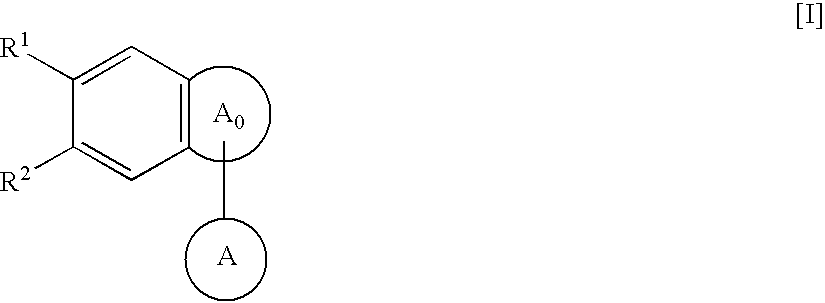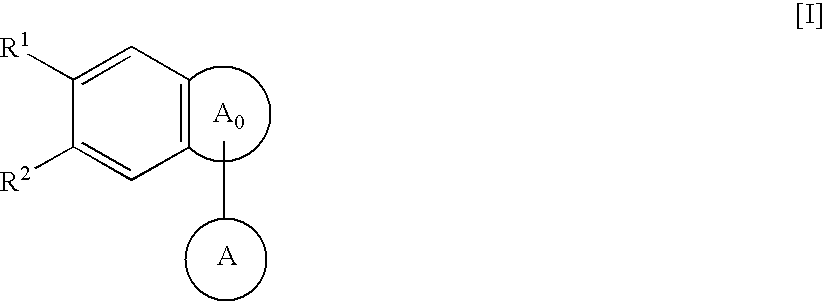Condensed polycyclic compounds
a polycyclic compound and condensed polymer technology, applied in the field of condensed polymer compounds, can solve the problem that the pde inhibitory activity of theophylline is non-specific, and achieve the effect of excellent anti-pde4 activity
- Summary
- Abstract
- Description
- Claims
- Application Information
AI Technical Summary
Benefits of technology
Problems solved by technology
Method used
Image
Examples
example 1
[0070] (1) 2-Amino-3-(3,4-dihydroxyphenyl)propanoic acid (98.6 g) is dissolved in formic acid (900 ml), and thereto is added acetic anhydride (300 ml). The mixture is stirred at room temperature for 3 hours. The reaction solution is concentrated under reduced pressure, and to the resulting residue is added distilled water, and the mixture is further concentrated under reduced pressure. The residue is dissolved in distilled water (150 ml), and thereto are added a 10M aqueous sodium hydroxide solution (150 ml) and dimethyl sulfate (95 ml) under ice-cooling. To the mixture are further added three portions of dimethyl sulfate (totally 285 ml) every 30 minutes, during which a 10M aqueous sodium hydroxide solution (290 ml) is added dropwise, and the reaction temperature is kept at below 40° C., and the pH value is kept at pH 5 to 9. The mixture is stirred at room temperature overnight, and then 10M aqueous sodium hydroxide solution (50 ml) is added thereto. The mixture is further stirred ...
example 2
[0090] (1) Ethyl 2-amino-3-(3,4-dimethoxyphenyl)propionate (the compound obtained in Example 1-(1)) (15.2 g), 4-isopropyloxybenzoic acid (10.8 g), and 1-hydroxybenzotriazole monohydrate (9.2 g) are dissolved in methylene chloride (120 ml), and thereto is added 1,3-dicyclohexylcarbodiimide (12.4 g) under ice-cooling, and the mixture is stirred at room temperature overnight. The insoluble materials are removed by filtration, and the filtrate is washed with a saturated aqueous sodium hydrogen carbonate solution and a saturated brine, dried over magnesium sulfate, and concentrated under reduced pressure. The precipitated crystals are collected by filtration with diethyl ether to give ethyl 3-(3,4-dimethoxyphenyl)-2-{[4-(isopropyloxy)-phenyl]carbonylamino}propionate (24.2 g).
[0091] M.p.: 126-128° C.
[0092] MS (m / z): 415 (M+)
[0093] (2) The compound obtained in the above (1) is treated in a similar manner as in Example 1-(3) to -(6) to give 6-[4-(isopropyloxy)-phenyl]-8,9-dimethoxy-1,3,4...
examples 3-8
[0096] The corresponding starting compounds are treated in a similar manner as in Example 1-(1) to -(6) or in Example 2 to give the compounds as listed in Table 1.
TABLE 1PhysiochemicalEx. No.R3Ring Aproperties3**HM.p.: 201-203° C. (decomp.)4**HM.p.: 209-211° C. (decomp.)5**HM.p.: 232-235° C. (decomp.)6**HM.p.: >250° C.7**HM.p.: 178-183° C. (decomp.)8**HM.p.: 228-233° C. (decomp.)
**Dihydrochloride
PUM
 Login to View More
Login to View More Abstract
Description
Claims
Application Information
 Login to View More
Login to View More - R&D
- Intellectual Property
- Life Sciences
- Materials
- Tech Scout
- Unparalleled Data Quality
- Higher Quality Content
- 60% Fewer Hallucinations
Browse by: Latest US Patents, China's latest patents, Technical Efficacy Thesaurus, Application Domain, Technology Topic, Popular Technical Reports.
© 2025 PatSnap. All rights reserved.Legal|Privacy policy|Modern Slavery Act Transparency Statement|Sitemap|About US| Contact US: help@patsnap.com



